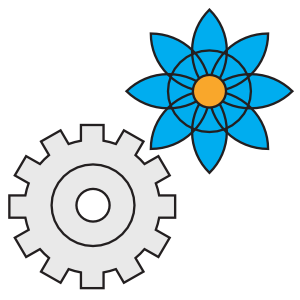Digital-Starter-Kit-Release-Jan-2021
Version vom 27. Januar 2021, 12:05 Uhr von Andre.baier (Diskussion | Beiträge) (→Building blocks - What is that?)
Digital Starter-Kit - Release - Overview of the Blue Engineering Seminar
Main Learning Outcomes
- to not only solve problems, but to actually define them
- to learn with and from others
- share, analyze and discuss information on technology and society
- to practice participation and democratic interaction
- to consider technology and nature as social conditions
Student Driven Course Design
- professor/lecturer is responsible for the seminar and supervises the student tutors
- student tutors
- organize the entire seminar
- conduct one third of the seminar
- students
- are involved and interact all of the time
- conduct two thirds of the seminar
- contribute to the future development of the seminar
Hard Facts of the Seminar
- concept is used now for 10 years and is continually developed
- transferable and adaptable concept - established at nine universites
- integrated as compulsory elective module in numerous Bachelor study programs
- 3 to 6 ECTS points
- analogue seminar - 90 > 180 minutes presence time
- digital seminar - 90 > 120 minutes presence time plus 60 minute preparation/follow-up
- Assessment
- Semester Project - Developing, conducting and documenting new building block
- Learning Journal - personal reflection and transfer
- in total around 400 students per semester
- 150 participants per semester at TU Berlin with three tutors
- 30 participants per semester at TU Hamburg with two tutors
- fully established at nine universities in Germany plus two to come in the next summer semester
- TU Berlin, TU Hamburg, TU Dresden, Uni Stuttgart, TH Köln, HAW Hamburg, HTW Berlin, HS Düsseldorf, HS Ruhr West
- Uni Rostock, Uni Paderborn
Schedule of the Seminar
- around 13 to 15 weekly meetings
- analogue - 90 to 180 minutes + little preparation/follow-up
- digital - 90 to 120 minutes + 60 minutes preparation/follow-up
Three Phases of the Seminar
- Phase 1 - tutors conduct basic building blocks
- Phase 2 - participants conduct existing building blocks
- Phase 3 - participants conduct newly developed building blocks
Building blocks - What is that?
- modular teaching/learning units which cover one specific topic
- preparation - video conference - follow-up
- diverse methods and didactics - well documented
- teaching/learning process is largely transferred towards participants
- facilitation instead of experts’ knowledge
- all building blocks are included in the digital starter kit
Examination - 100 points in total
- 50 points – semester project: develop, perform and document a building block with your team
- 50 points – personal journal: reflect the weekly sessions
- Participation in weekly video conference is mandatory
- max. 2 missed sessions per semester
Semester Project: develop, perform and document an own building block - 50 out of 100 points
- Participants in groups of 3 to 5 develop a new building block
- Documentation of the building block
- Dress rehearsal of the building block
- Peer-to-peer feedback
- Incorporation of feedback
- Premiere of the building block
- Submission of documentation - final version
Personal Learning Journal – What is it for? - 50 out of 100 points
- record your reflection on seminar’s content and your personal conclusions
- use the tools within your journal
- go a step further: newspaper articles, documentaries, conversations with friends…
- include creative elements: inner dialogue, sketches, collages, role plays, songs…
- some tasks of preparation and follow-up can be done in the journal
- about 300 words per entry
- analogue or digital - submission as PDF
Example Building Block - 100 Points – Demands on Technology Design - Digital
Individual Work - Your Demand on Technology Design
Task 1: Your Demands on Technology Design – Individual Work - 3 min
- List all important values/demands YOU want to be considered when technology is designed.
- e.g. profitability
Task 2: Rank your demands – Individual Work - 2 min
- Score the values/demands you have just noted down by distributing 100 points in total amongst them.
- e.g. profitability (20 points) - value 2 (30 points) - value 3 (50 points)
Group Work - Collective Demands on Technology Design
Overview of Tasks - Small Group Work - 7 min
- Task 1: Present your personal demands and rankings to each other
- Task 2: Agree on one set of demands as a group and score it
- Task 3: Post your results in the forum
Task 1 - Present your personal demands and rankings - 3 min
- Briefly present your values and your ranking to each other
- Pay attention to similarities/differences when the others speak
- Refer to the others when you speak
Task 2 - Agree on one set of demands as a group and score it - 4 min
- Agree on values as a group and distribute 100 points among them
Task 3 - Post your results in the Chat
- Choose one person per group to posts your demands/ranking in the chat
- 'for example - value A (50) - value B (30) - value C (20) -

